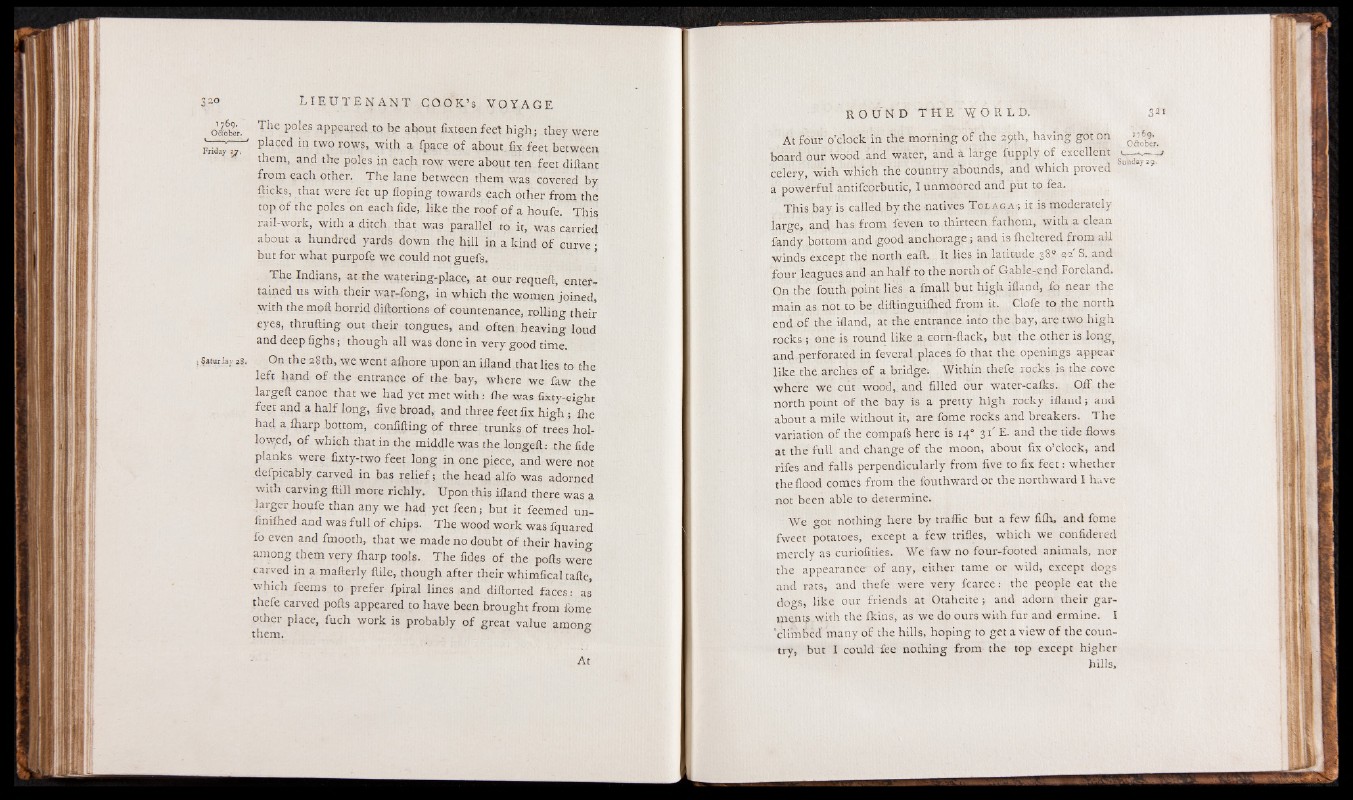
October. 'I'^e PG-es aPPcai'ed to be about fixtqcn feet high; they were
Friiay'p, ’ Placed in two rows, with a fpace of about £x f eet between
them, and the poles in each row were about ten feet diftant
from each other. The lane between them was covered by
flicks, that were fet up doping towards each other from the
top o f the poles on each fide, like the roof o f a houfe. This
rail-work, with a ditch that was parallel to it, was carried
about a hundred yards down the hill in a kind of curve •
but for what purpofe we could not guefs.
The Indians, at the watering-place, at our requeft, entertained
us with their war-fong, in which the women joined,
with the mod horrid diflortions of countenance, rolling their
eyes, thrufting out their tongues, and often, heaving loud
and deep fighs; though all was done in very good time,
i SaturJay z8. On the 28th, we went aihore upon an ifland that lies to the
left hand of the entrance of the bay, where we faw the
largeft canoe that we had yet met with: Ihe was fixty-eight
feet and a half long, five broad, and three feet fix h igh ; Ihe
had a fliarp bottom, confiding of three trunks of trees hollowed,
of which that in the middle was the Iongeft: the fide
planks were fixty-two feet long in one piece, and were not
defpicably carved in bas relief ; the head alfo was adorned
with carving ftill more richly. Upon this ifland there was a
larger houfe than any we had yet feen; but it feemed un-
finifhed and was full of chips. The wood work was fquared
fo even and fmooth, that we made no doubt of their having
among them very lharp tools. The fides of the polls were
carved in a mafterly flile, though after their whimfical tafte,
which feems to prefer fpiral lines and diftorted faces: as
thefe carved polls appeared to have been brought from fome
other place, fuch work is probably of great value among
them. ^
At
R O U N D T H E w o r l d . fljg
At four o’clock in the morning of the 29th, having got on
board our wood and water, and a large fupply of excellent
celery, with which the country abounds, and which proved
a powerful antifcorbutic, I unmoored and put to fea.
This bay is called by the natives T olaga; it is modeiately
large, and has from feven to thirteen fathom, with a clean
fandy bottom and good anchorage; and is flickered from all
winds except the north eaft. It lies in latitude 38° 22'S. and
four leagues and an half to the north of Gable-end Foreland.
On the fouth point lies a fmall but high ifland, fo near the
main as not to be diftinguifhed from it. Clofe to the noith
end of the ifland, at the entrance into the.bay, are two high
rocks -, one is round like a corn-flack, but the other is longj
and perforated in feveral places fo that the openings appear
like the arches of a bridge. Within thefe rocks is the cove
where we cut wood,, and filled our water-calks. OfF the
north point of the bay is a pretty high rocky ifland; and
about a mile without it, are fome rocks and breakers. The
variation of the compafs here is 140 31' E. and the tide flows
at the full and change of the moon, about fix o’clock, and
rifes and falls perpendicularly from five to fix fee t: whether
the flood comes from the fouthward or the northward I have
not been able to determine.
We °-ot nothing here by traffic but a few fifh, and fome
fweet potatoes, except a few trifles, which we confidered
merely as curiofides. We faw no four-footed animals, nor
the appearance" of any, either tame or wild, except dogs
and rats, and thefe were very fcarce: the people eat the
dogs, like our friends at Otaheite ; and adorn their garments
with the fkins, as we do ours with fur and ermine. I
’climbed many of the hills, hoping to get a view of the country,
but I could fee nothing from the top except higher
hills,